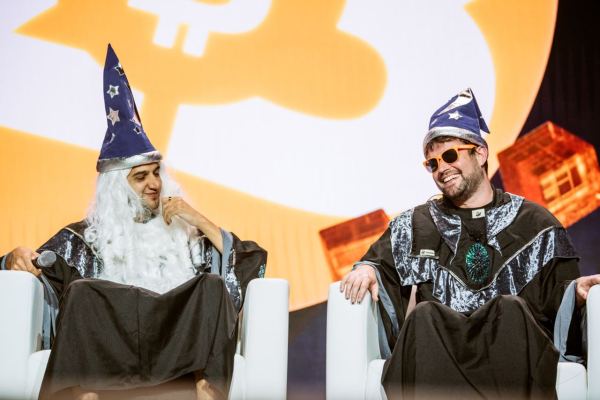Though Bitcoin is considered to be the grandfather of crypto, it’s not always talked about for its innovation or pushing the envelope. Some want it to stay that way, but not everyone.
Taproot Wizards, a Bitcoin-focused Ordinals project that was inspired by the original Bitcoin wizard Reddit meme from a decade ago, is trying to change the way the blockchain is perceived. The project has raised $7.5 million in a round led by Standard Crypto, Taproot Wizards co-founders Udi Wertheimer and Eric Wall shared exclusively with TechCrunch+. They declined to disclose a valuation.
“We’ve been in Bitcoin for over a decade. We have these memories of how Bitcoin was. It was very experimental, but it changed,” Wertheimer said. “We want to bring back the culture of building on Bitcoin and make it magical again.”
Other investors include Geometry, Collider Ventures, StarkWare, UTXO Management, Bitcoin Frontier Fund, Masterkey and Newman Capital. The money will be used to rebuild Bitcoin’s “wizard village,” which symbolizes the ecosystem’s desire to compete with other major blockchains like Ethereum and Solana. “We want to enable or introduce a new way of being a Bitcoiner,” Wall said.

Image Credits: Taproot Wizards (opens in a new window)
This investment has similar potential to the one Yuga Labs made in Bored Ape Yacht Club, said Standard Crypto co-founder Alok Vasudev. “There’s a lot they can do there in building the brand, potentially other collections under the umbrella, but more interestingly we think there’s also interesting infrastructure opportunities for a more dynamic Bitcoin ecosystem,” he said. Standard expects to be a part of that movement, rather than just a steward of an NFT collection.
“The reason we went for a larger round is because we think time is of the essence,” Wertheimer said. “We care a lot about Ordinals and Taproot Wizards, but our mission is bigger than that; we want to bring innovation back to Bitcoin.”
Taproot Wizards has a limited mint of 2,121 wizards, the specific number paying homage to the total supply of bitcoin: 21 million. Of that total, 2106, or 99.3%, have been inscribed, but less than 1% — 20 Taproot Wizards’ Ordinals — have been distributed so far. Wertheimer said they are not sharing the exact pacing of its releases because they didn’t want the hype to fade off quickly. “We want to find people on a mission, not those focused on JPEGS,” he said.
Ordinals have been given to active community members who participated in its “wizard school” or who are die-hard fans, getting tattoos or sending in videos of them showering in wizard outfits for the opportunity to claim one.
Ordinals, which are comparable to NFTs, launched in December 2022 and gained significant momentum from the Bitcoin community and others in the beginning of 2023. Even though the bigger NFT industry for Ethereum- or Solana-based digital collectibles was declining in value, Ordinals were gaining traction.
By mid-March 2023, one of the biggest NFT marketplaces, Magic Eden, launched a Bitcoin-focused marketplace for Ordinals, partnering with 13 collections with the “strongest communities,” including Taproot Wizards, COO and co-founder of Magic Eden Zhuoxun Yin said at the time.
The total number of inscriptions hit 40.4 million on Wednesday, up 14% from the month-ago date, according to Dune Analytics data. On November 12, the number of daily Ordinals inscribed hit an all-time high of over 505,000.
“If this was just a hype thing, I wouldn’t have been interested,” Wertheimer said. “We’ve been in Bitcoin and crypto for 10 years; we see this as an opportunity to push Bitcoin forward. Hype cycles come and go; there’s a fundamental shift here.”
Even though there’s continued growth for Ordinals, the Bitcoin community still remains divided on whether NFTs on its blockchain should happen. “Ordinals started at a time where there weren’t tailwinds behind it,” Vasudev said. “[Taproot Wizards is] growing despite headwinds, and it speaks to the power of what’s here and what a company like this can serve as.”
Some projects, like Taproot Wizards, believe that Ordinals are a positive and fun way to expand the Bitcoin ecosystem. But other “Bitcoin maximalists” criticize these projects for making a “joke” of the ecosystem, taking block space on the network and raising transaction fees, among other things.
“We think [Bitcoin’s innovation] has been stagnating because of cultural reasons, not technical ones, and those can be solved,” Wertheimer said. “Once that’s broken, we think it’s going to improve.”
Some people in the Bitcoin community have tried to stop the project, Wall said. “There are influential Bitcoiners who have tried to develop code or encourage miners to censor this type of activity on the block[chain], which is completely against the ethos of Bitcoin; they can’t really stop us from having fun with it.”
Although Bitcoin is gaining traction in the NFT world, compared to Ethereum and Solana, the other biggest blockchains for NFTs, it still has room to grow. But in the past 30 days, Bitcoin was the second largest blockchain by NFT sales volume at about $163 million, up 1,074% during the time frame, behind Ethereum, which saw $279.8 million in sales, according to CryptoSlam data.
“I think the Ethereum and Solana ecosystems are definitely going to continue to exist and grow,” Wertheimer said. “But Bitcoin and Ordinals will attract people looking for long-term value. It’s a way for people to get started in Bitcoin without having to buy 10 BTC.”
All in all, there’s thousands (if not millions) of NFT collections out there, and it’s hard for many to stand out. But the co-founders see Taproot Wizards in a different bucket.
“With what we do, I don’t see it as an NFT collection with a mission,” Wertheimer said. “It’s a mission with an NFT collection that wants to make Bitcoin magical again. It’s giving that community a symbol to go out and make it happen, which is the really important part.”
The article has been updated in the seventh paragraph.
